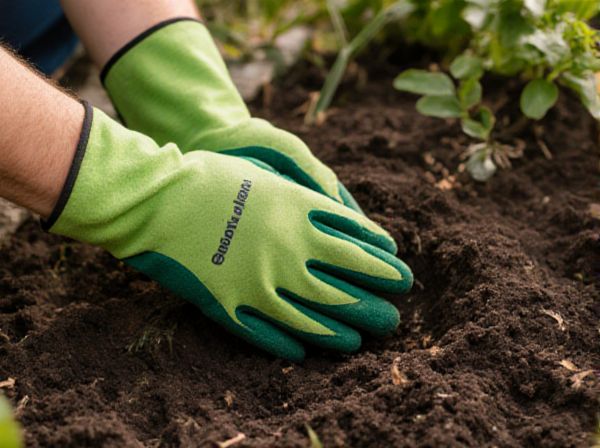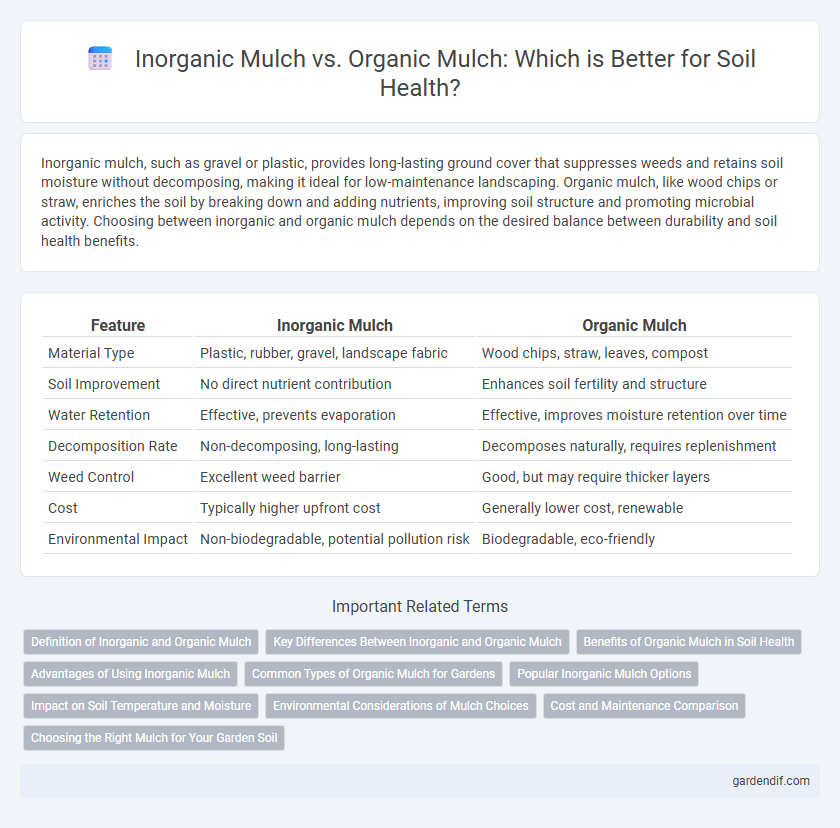
Inorganic Mulch vs Organic Mulch Illustration
Inorganic mulch, such as gravel or plastic, provides long-lasting ground cover that suppresses weeds and retains soil moisture without decomposing, making it ideal for low-maintenance landscaping. Organic mulch, like wood chips or straw, enriches the soil by breaking down and adding nutrients, improving soil structure and promoting microbial activity. Choosing between inorganic and organic mulch depends on the desired balance between durability and soil health benefits.
Table of Comparison
| Feature | Inorganic Mulch | Organic Mulch |
|---|---|---|
| Material Type | Plastic, rubber, gravel, landscape fabric | Wood chips, straw, leaves, compost |
| Soil Improvement | No direct nutrient contribution | Enhances soil fertility and structure |
| Water Retention | Effective, prevents evaporation | Effective, improves moisture retention over time |
| Decomposition Rate | Non-decomposing, long-lasting | Decomposes naturally, requires replenishment |
| Weed Control | Excellent weed barrier | Good, but may require thicker layers |
| Cost | Typically higher upfront cost | Generally lower cost, renewable |
| Environmental Impact | Non-biodegradable, potential pollution risk | Biodegradable, eco-friendly |
Definition of Inorganic and Organic Mulch
Inorganic mulch consists of non-living materials such as plastic, rubber, gravel, and landscape fabric that provide ground cover without decomposing, offering long-lasting weed suppression and moisture retention. Organic mulch includes natural, biodegradable substances like wood chips, straw, leaves, and compost that improve soil fertility and structure as they break down. Both types of mulch serve to regulate soil temperature, reduce erosion, and conserve moisture, but organic mulch actively enhances soil health through nutrient cycling.
Key Differences Between Inorganic and Organic Mulch
Inorganic mulch, made from materials such as rubber, gravel, and plastic, offers long-lasting soil coverage and excellent weed suppression but lacks nutrient contribution to the soil. Organic mulch, derived from natural sources like wood chips, straw, and leaves, enhances soil fertility by decomposing and enriching soil structure while retaining moisture. The key differences lie in their biodegradability, impact on soil health, and environmental benefits, with organic mulch promoting microbial activity and soil nourishment.
Benefits of Organic Mulch in Soil Health
Organic mulch improves soil health by enhancing moisture retention, regulating temperature, and enriching nutrient content through natural decomposition. It fosters beneficial microbial activity and earthworm populations, which promote soil aeration and nutrient cycling. Unlike inorganic mulch, organic mulch supports sustainable soil structure and long-term fertility, making it vital for healthy plant growth.
Advantages of Using Inorganic Mulch
Inorganic mulch, such as gravel, plastic, and rubber, offers superior durability and longevity compared to organic alternatives, reducing frequent replacement needs. It effectively controls weeds by blocking sunlight and limits soil erosion in various climatic conditions. Inorganic mulch also enhances moisture retention and maintains stable soil temperatures, promoting healthier plant growth throughout different seasons.
Common Types of Organic Mulch for Gardens
Common types of organic mulch for gardens include shredded bark, wood chips, straw, grass clippings, and compost. These materials improve soil fertility by breaking down and adding essential nutrients, while also retaining moisture and suppressing weeds effectively. Organic mulch enhances soil structure and supports beneficial microbial activity, promoting healthier plant growth.
Popular Inorganic Mulch Options
Popular inorganic mulch options include gravel, landscape fabric, rubber mulch, and plastic sheeting, each offering durability and reduced weed growth. Gravel provides excellent drainage and long-lasting ground cover, while landscape fabrics block weeds and allow water penetration. Rubber mulch, made from recycled tires, offers moisture retention and does not decompose, making it ideal for permanent applications.
Impact on Soil Temperature and Moisture
Inorganic mulch, such as plastic or gravel, reflects more sunlight and tends to increase soil temperature, which can accelerate seed germination but may reduce moisture retention by promoting evaporation. Organic mulch, including wood chips and straw, insulates soil by moderating temperature fluctuations and enhancing moisture conservation through slow decomposition and improved soil structure. This moisture retention supports microbial activity and root health, crucial for plant growth and soil fertility.
Environmental Considerations of Mulch Choices
Inorganic mulch, such as gravel or plastic, offers durability and weed suppression but may contribute to soil temperature extremes and reduced microbial activity, impacting local soil ecosystems. Organic mulch, including wood chips and straw, enhances soil fertility and moisture retention through natural decomposition, promoting biodiversity and carbon sequestration. Choosing organic mulch supports sustainable soil health by enriching nutrient cycles and reducing waste, while inorganic options may persist in the environment, necessitating careful disposal and long-term impact assessment.
Cost and Maintenance Comparison
Inorganic mulch, such as rubber or gravel, typically has a higher initial cost but requires minimal maintenance and lasts for many years without needing replacement. Organic mulch, like wood chips or straw, is generally less expensive upfront but demands regular replenishing and can decompose, increasing soil fertility over time. The choice between the two depends on balancing long-term durability with ongoing maintenance efforts and budget constraints.
Choosing the Right Mulch for Your Garden Soil
Inorganic mulch, such as plastic or gravel, offers excellent weed control and long-lasting durability, making it ideal for areas requiring low maintenance. Organic mulch, including wood chips, straw, or compost, improves soil fertility and moisture retention while promoting beneficial microbial activity. Selecting the right mulch depends on garden goals, soil health priorities, and local climate conditions to optimize plant growth and soil protection.
Inorganic Mulch vs Organic Mulch Infographic

 gardendif.com
gardendif.com